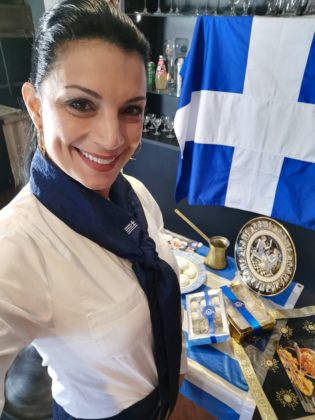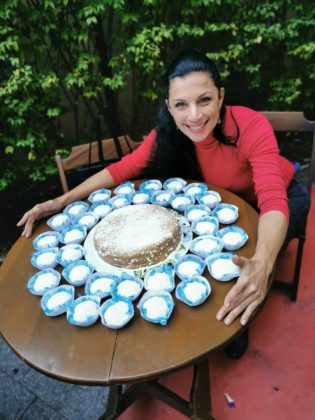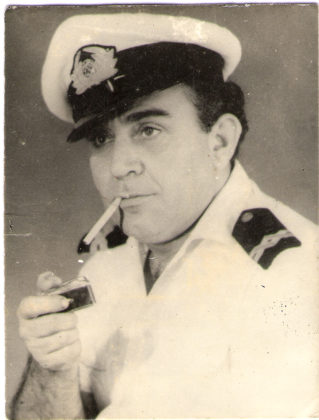Elizabete Botsaris: A descendant of a national Greek hero
My soul is Greek, she says in an interview with NEO
By Kelly Fanarioti
When she was a child, Elizabete Botsaris remembers her father telling her stories from his participation in the Greek-Italian war, as well as the legacy of the Botsaris surname. Elizabete, a 46-year-old architect who lives in Sao Paolo, Brazil, loved her father’s stories and feels immensely proud of her ancestral history.

‘’Markos Botsaris was my father’s great-great uncle,’’ she says proudly, during our Skype conversation. Speaking with the passion of a Latin-Mediterranean woman, she remembers countless hours listening with her brother to her father’s stories of Markos Botsaris. “When he was alive, my father, Vasilis Mihail Botsaris, had a large cross tattooed across his entire chest. He was always a very proud man. Besides my blood and my surname, the story of Botsaris is also a part of me.”

At the age of 20, Elizabete went to the Consulate in Sao Paolo to make a request to be granted Greek citizenship. Her father, a seaman who had travelled around the world, was born in Athens in 1928, and she was baptized Orthodox in a Greek church in Brazil by an Orthodox priest according to all the respective traditions, and went to a Greek school called “Institudo Educacional Ateniense”.
“At the Consulate, the old woman there was not welcoming. ‘Can you see this file on the table? I am busy and your situation is extremely complex. So, do not disturb me because I do not have time to deal with your case,’ she said to me. That was the first time I tried and I was totally disappointed: I felt incredibly sad. So, I decided to wait for a while and try again.”

To this day, 26 years later, Elizabete is still wrestling with the Greek bureaucracy to obtain her Greek citizenship, although she meets all the requirements.
“I am Greek, my soul is Greek, but I do not know why I am asked to prove that I am a daughter of Vasilis Mihail Botsaris, I cannot understand the reason they deny my citizenship. My father fought for the Motherland, and so, in my understanding, it is their duty to help me. The Botsaris family gave everything for Greece. My special case needs a more careful consideration, and it cannot be dismissed with generic assumptions.”

Vasilis Mihail Botsaris
Elizabete’s father, after serving in the Greek army during the Second World War old, from the age of 12 to 18, eventually went to Brazil looking for a better future. He worked as an electrician, merchant, bricklayer, plumber, and later, seaman. When Elizabete was born, her parents were not married, and this is one of the reasons that the Greek authorities deny her Greek citizenship.
“Here, in Brazil, it is not a problem to live and start a family with someone else. My father has signed the papers which confirm that I am his daughter. My surname is Greek. I am not inventing all this. My father passed away in 2003, and I am still crying every time I see my documents and applications for Greek citizenship.”
“My mission in life is to preserve the traditions and promote the Greek culture”
In order to promote Greek culture and gastronomy in Brazil, Elizabete produces a line artisanal and traditional sweets, like Christmas honey cookies, also known as melomakarona, almond snowballs, and baklava. The name of the mini sweets production line is “BOT (the nickname of Botsaris) DOCES GREGOS” and the Brazilians are very excited about her delicious flavors.

“I produce from 1,000 to 3,000 sweets a month, sell them to natives and Greeks who live here, and they are always asking me for more,” she states happily and continues: “I love the process, not just baking, but the packing and delivery as well. I am also writing a letter to each client, describing all the ingredients and how the sweets need to be eaten, because Brazilians don’t know. For example, a guy told me that he tried to eat a kourambie with a knife and fork. And I said ‘No, you need to have it in your hands and put it in your mouth.’” (Laughs).
She came to Greece twice, in 2018 and 2019, when she asked for a meeting with the Director of Citizenship Department Ministry of Interior, Chris Saritzoglou, to discuss with him the status of her request. Unfortunately, Saritzoglou was on summer vacation and informed her that her case would be dealt with by the end of 2019. Then the Covid pandemic struck and all the replies she received last year from the Ministry of Interior repeatedly stated that during Covid-19 all processes were stopped and that she had to wait.
“I want to come again to Greece, learn the language, and meet my uncles, cousins and other relatives, and I also hope to get the double citizenship, to be Greek and Brazilian. It is my birthright, according to my upbringing and education, to the dual nationality that will allow me to honor my origins and my surname. The legacy of Botsaris lives on through all of us the descendants and blood relatives, honoring our history, regardless of where we live.”











0 comments